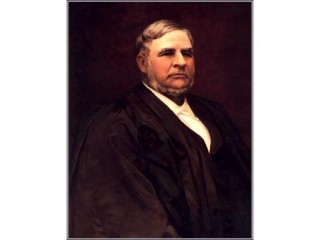
Davis David biography
Date of birth : 1815-03-09
Date of death : 1886-06-26
Birthplace : Cecil, Maryland, United States
Nationality : American
Category : Politics
Last modified : 2010-06-09
Credited as : Supreme Court Justice, ,
0 votes so far
Davis later served on the Illinois constitutional convention. His most significant act there was installing a system of popularly elected judges to replace a system based on legislative election. (Popular election of judges often brings hacks and political cronies to the bench. The infamous "Greylord" scandal in Chicago--in which judges and lawyers were identified through recordings and videos as on the take--may be directly attributable to Davis's actions in 1847.) Davis was elected judge under his new system, a position he held until he was appointed to the United States Supreme Court. Both Lincoln and Stephen Douglas practiced before Judge Davis.
Davis joined the Republicans when the Whig Party was dismantled and served as Lincoln's campaign manager in 1860, helping secure the Republican presidential nomination for his longtime friend. Lincoln won. Even after Lincoln nominated Davis to the Supreme Court and he was confirmed in 1862, the justice retained his appetite for partisan politics. While still serving on the Supreme Court, Davis was nominated for president by the Labor Reform party in 1868. Davis sought to employ this nomination to gather support for his candidacy from the liberal Republicans who, like Davis, were opposed to U.S. Grant for president. Ultimately, of course, Davis was unsuccessful in his bid for the White House.
Overall, Davis did not really enjoy his work on the Court. He found the appellate bench disagreeable for the hard study and labor it required. Davis became tired of the Court and was elected to the U.S. Senate by the Illinois legislature in 1877. As one commentator remarked of Davis's career on the Court: "Davis wrote nothing but that stirring and ultimately disappointing opinion against military trials in Ex parte Milligan; it is surprising only that it took him so long to discover that he would really be better off in the Senate." He served one term before retiring from public life and died in 1886.
















